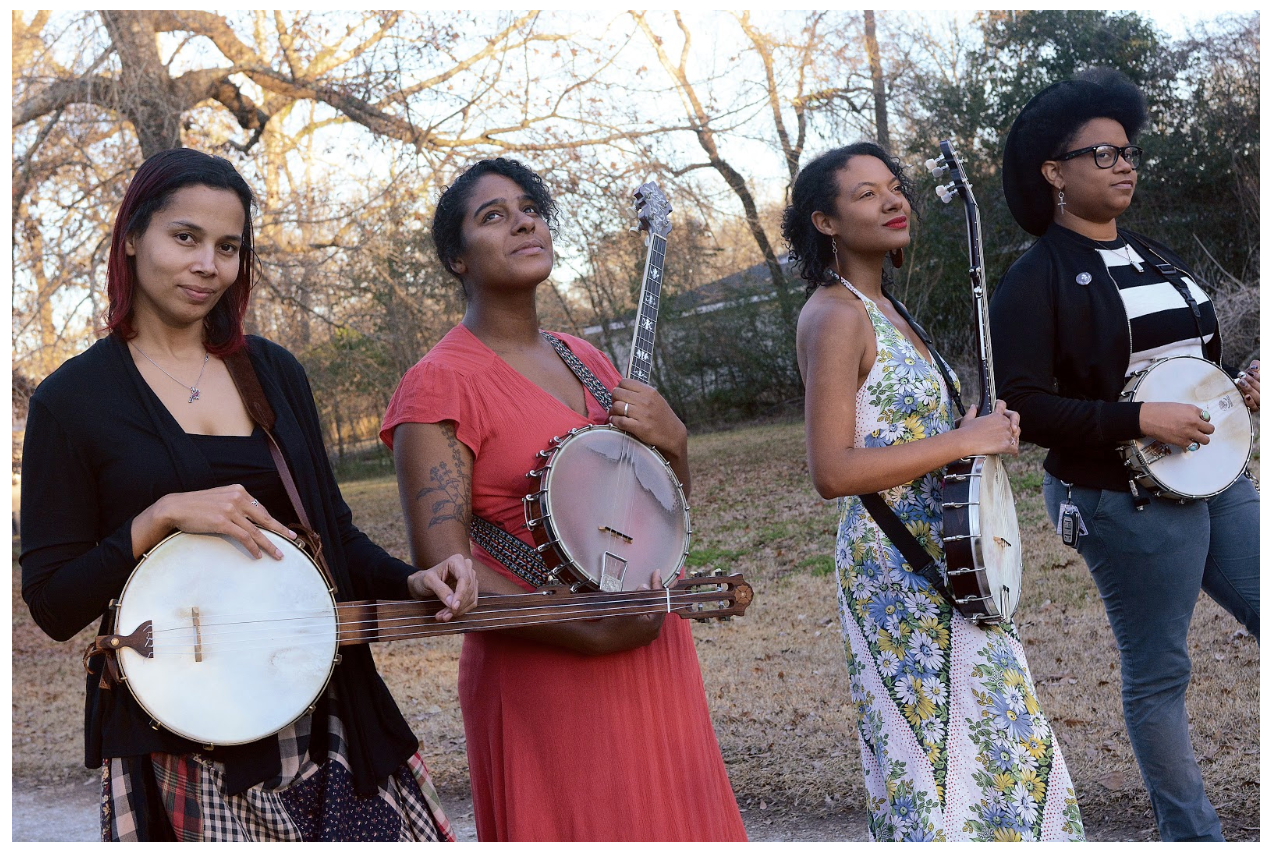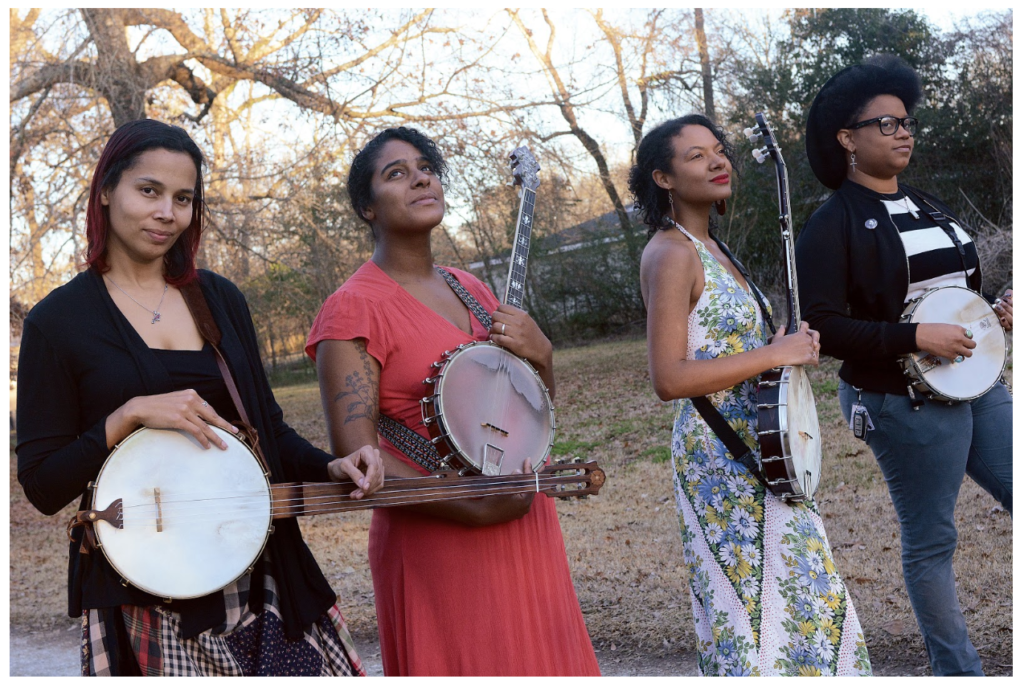An Interview with Leyla McCalla (Our Native Daughters): At the Center
As we welcome the last day of Newport, on a weekend that has been so rife with collaboration, one of the most anticipated sets is Our Native Daughters. The group was formed through Rhiannon Giddens’s idea to bring together Black women folksingers, all of whom play the banjo, to reimagine and interpret traditional music. The group she formed–Amythyst Kiah, Allison Russell, and Leyla McCalla–surpasses the idea of a supergroup. They are all multi-instrumentalists and all have had incredibly inventive and unique careers, which they have used to not only explore music, but to challenge our country to be a more just nation. Their album, which quickly shifted to writing original work together, speaks to the history of racism and brutality that has long been erased in our country, and also to the power and promise when Black women’s voices are centered. It was such a privilege to talk with Leyla McCalla ahead of what is sure to be a transformative moment for all of us who get to experience it.
This opportunity just seems so unique. Can you talk about how those ten days in the studio felt for you as a writer, as a musician?
I felt excited. It’s really exciting to be stepping out of my comfort zone a little bit because it’s not my show that I do all the time, which I also really believe in. But I recognize that this is a special opportunity, and a special coming together, of these particular minds, and voices, and instruments.
It’s really exciting that other people are excited about it and I just want to focus on putting on the best show, and being as clear with our words as we can be, and representing ourselves and what this album is about in the most powerful way. And live performance brings a lot to light–even though you’ve been in the studio and recorded something, it’s such a different experience to be on stage. I think it’s going to be really good for the group to be around each other. The last time we were all around each other was in the studio.
As you’ve thought about the performances, have you all talked explicitly about some of the things you hope people experience, or is that something you have to feel night-to-night?
We have not talked specifically about how we want people to feel about the music, but what we are clear about is where we’re coming from and the honesty that has gone into this work. And I think that is going to speak for itself and it’s not even something we need to speak about. So we’re more concerned with putting this together musically. That’s really the challenge at this point.
We all are very used to confronting and talking about these issues. We’ve all lived in our skin our entire lives, and our experiences are a big part of the creation of these songs. And I think that’s what’s so special about this, that it actually exists in this time where we do not fear speaking our minds in ways that previous generations have.
It’s incredible–an artist like Mavis Staples. She’s on my mind because I’m such a fan of hers and because she’ll be a Newport. She’s 80 years old, has lived through generations, and she came up through the Civil Rights movement. She was proposed to by Bob Dylan! But the exciting thing is we’re sort of at the beginning, in a way, because I plan on making music when I’m 80 years old. I feel like it’s related to this question about message, and what we want people to feel; but when you embody your message because of your mere existence I think people cannot help but acknowledge that.
In one of the videos about the project, Rhiannon made a comment that it’s rare to speak this honestly in the folk world. And I feel like one of the challenges in “the folk world” is that there’s a lot a well-intentioned white folks who haven’t really looked at how we perpetuate white supremacy.
Not just in the folk world, but white people are not used to being challenged and confronted. That’s kind of a new thing. We have this whole call-out culture, which is perpetuated by social media, but this is deeper than calling anybody out. It’s part of a larger conversation of: how did we get here? If you have not had to think about that because you have not been discriminated against because of the color of your skin or because of your appearance, you will not have confronted that [question] out of a vacuum. I think that is part of the power of this album and us as Our Native Daughters.
We have not been able to hide who we are for our whole lives, and it’s time for us all to stop hiding under this false pretense that the playing field is level, because it’s not and there are specific reasons why it’s not. And it dates back to the founding of our country and the idea of who is human and who is not fully human. And to think about the economic reality of how this country has built its wealth. It would not have happened this way without the slave trade, and not just in this country, but all throughout Western Europe. You see devastated economies throughout the Caribbean and Latin America, and that didn’t come out of a vacuum either. So I think it’s more about how do we have an honest conversation where we are unapologetically Black, unapologetically ourselves and where we are seizing this moment that we are in.
You have said that your last solo album, “The Capitalist Blues,” represented a time of finding your voice, and gaining confidence, not thinking primarily as a cellist. How do you think working on that record impacted your work on “Songs of Our Native Daughters”?
It definitely did. With every album, my perspective on how to create shifts, and transforms, and grows. I was in a good mental place, thinking more as a songwriter and a singer, and then, of course, as a cellist. And I was just kind of more aware of how to work in a productive way–because it was also really fast. We went in the studio and it was two days later that I had recorded two songs, overdubbed on seven songs, and sang on a bunch of songs. The process wasn’t like we were all there at the same time. People were coming and going, I was on tour, there were different schedules. I drove to Lafayette and stayed for three days and two nights and it was intensive in that way.
It was kind of amazing to me because I had gotten the project description from Rhiannon, but the description we started out with is not what we created. Which I think is totally natural and normal. We were all together and all of a sudden it was like: we’re four black women, talking about the people who have come before us.
It was like… you know, you see 19th century vintage clothes…and, as a black person, you just have a different feeling of nostalgia for that time. And this is an album where we’re able to be like: “This is the feeling when we think about that time.” There are all these plantations that people tour in the South that don’t talk about slavery at all, that just talk about antique furniture and how the rocking chairs were made. And that is totally not the story that comes to mind when I’m in those kinds of spaces. And so this was a very validating experience for all of us because we weren’t centering any kind of sanitized narrative about what this country is and how we’ve gotten to where we are.
So as you were coming and going, how challenging was it to capture the emotional quality of the songs while also working on them together, giving feedback, etc.?
Creatively, it felt very stream of consciousness and to have each other to bounce ideas off made the self-edit process a lot more productive. Normally, when I’m writing a song by myself, I’m constantly throwing away ideas. But when you’re surrounded by other people that you can bounce ideas off of, the idea you thought was a shit idea, they’re like, “There’s actually something there; let’s go a little bit deeper.” And then there were other songs, where it was: “That’s the song.” It was written like that, and that’s all it is, and all we have to do is figure out how to play it.
There’s a song I wrote with Alli, “I Knew I Could Fly,” and it would not have happened without Alli. That particular riff that I’m playing was inspired by Etta Baker’s Piedmont guitar style. But I told her, “I have this song that I’ve been playing for forever, but I’ve never been able to write words that feel like they’re the right words.” And she said, “OK, well let’s sit.” And we just talked and before you knew it, there were verses on the paper. And I don’t think I could have done that on my own, because I had what the melody should be, but I didn’t have the words, and I didn’t have a sense of what this song is about.
Our Native Daughters will be on the Quad Stage today. See you there.
Photo Credit: Terri Hensel


